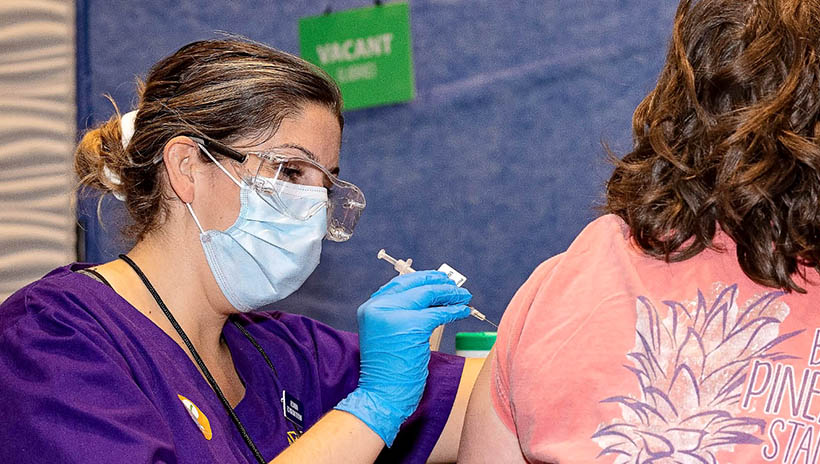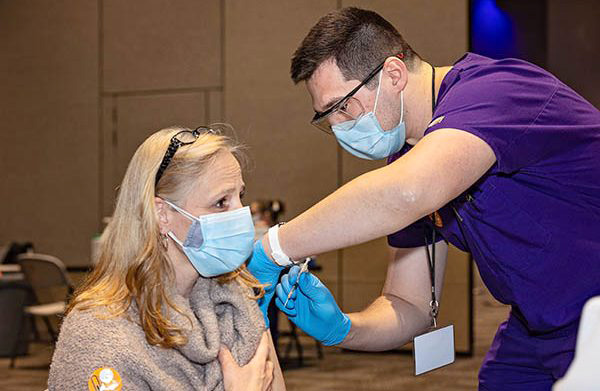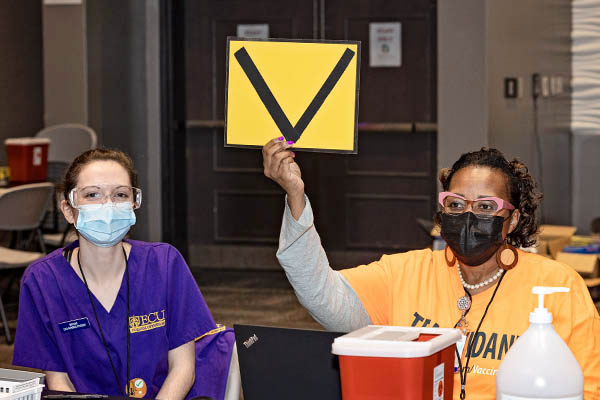Publisher's Note: This post appears here courtesy of
ECU News Services. The author of this post is
Natalie Sayewich.
ECU Nursing student Alex Yllanes gives COVID-19 vaccines during a clinic event at the Greenville Convention Center on March 22, 2021. | Photos: Cliff Hollis | Video: Rich Klindworth
Alex Yllanes and Eric Japczyk Schuler began their nursing education just a few months ago, but they're already playing a crucial role in helping to slow the global pandemic that recently marked its first anniversary.
They were among a group of 20 accelerated second-degree BSN students from ECU's College of Nursing helping to give the life-saving — and what are hoped to be pandemic-ending — vaccines at Vidant Health's large-scale COVID-19 vaccine clinic at the Greenville Convention Center on Monday, March 22.
As of March 18, Monday's group at the convention center was one of 44 nursing student clinical groups that have participated in five vaccine clinics in Pitt, Wilson and Wayne counties since the spring semester began. More than 230 students from both undergraduate and graduate programs have recorded 1,128 contact hours in vaccine clinics in that time. Another 30 groups with a total of 15 faculty and 175 students are scheduled to assist with clinics between March 21 and April 30.
Combined with faculty volunteer efforts, the College of Nursing has provided more than 1,800 hours of COVID-19 related support across the state since the pandemic began.
"I think we were all really excited to be a part of it," said Japczyk Schuler, who gave his first intramuscular injections as part of the clinic.
"We've been in the house for a year, waiting for this to be over. Now, today, to be able to give shots is wonderful."
With oversight from ECU Nursing faculty and Vidant nurses, the students spent the day guiding patients through the registration process, answering their questions, helping with logistics, administering vaccines and monitoring those who were newly vaccinated as they relaxed to the soothing sounds of ECU's Four Season's chamber musicians (part of the
Dose of Hope Concert Series at Vidant's large-scale clinic) for 15 to 30 minutes after their shot.
Graduate nursing students — who are already licensed RNs — have also served in these roles with the added responsibility of drawing up the vaccines into syringes from vials. Students are able to use their vaccine clinic hours toward fulfilling up to 10% of their program's clinical requirements as they serve area communities and keep people healthy.
ECU Nursing student Eric Japczyk Schuler gives a COVID-19 vaccination at a clinic event in the Greenville Convention Center.
"This is part of what we should be doing as nurses — helping to end this global pandemic, helping out where we can," said ECU College of Nursing Associate Dean for Academic Affairs Dr. Annette Peery, adding that students have not been put in positions where they would come in contact with COVID-positive patients.
"It also ties into the university's mission of public service and regional transformation — that all ties together for me. I think it's a great way to have them do service but also get some great hands-on experience."
For agencies like Vidant that have organized to provide thousands of vaccines a day, the student assistance is a valued resource.
"The student presence on site with the large-scale vaccination clinic has been a tremendous asset in meeting Vidant's mission of improving the health and well-being of Eastern NC and in helping stop the spread of COVID-19," said Vidant Education Specialist Andrea Kelly.
"Since opening the large-scale vaccination clinic the students here have been able to assist in many of the vital roles on-site including vaccination, observation and navigation."
Students, meanwhile, have benefitted from working closely with clinic nurses and gaining first-hand experience with being part of interprofessional health care teams.
"The students' interactions with our clinic and the clinic staff have allowed them to see the flexibility that nurses need to adapt to a rapidly changing health care environment and have allowed them to see how to a multidisciplinary team can come together and achieve success," Kelly said.
Being part of the historic effort to end the pandemic that has now claimed more than two million lives worldwide is especially rewarding.
"It's overwhelming, but I'm full of gratitude to be a part of it," Yllanes said.
"Especially going into the health care field. ... To be able to be part of that solution is really special."
Nursing Faculty Serving Our State
The faculty's volunteer efforts have had an even broader footprint across North Carolina since the pandemic began more than a year ago. They have logged 689 volunteer hours across 28 agencies in 14 counties, and
assisted statewide entities such as NCDHHS as of March 18. Their work has included assisting at COVID-19 vaccine clinics, testing sites, helping with disaster planning, providing community education about the virus and aiding food distribution to those with limited access.
Dr. Laura Gantt, professor and associate dean for nursing support services, has so far volunteered 53 hours giving vaccines, most of those in Tarboro with the Edgecombe County Health Department. As a rural area, they have access to fewer resources to manage a large-scale vaccine program, Gantt said.
"I have been dedicated to helping with this effort because I believe vaccines are a major part of getting us past the pandemic," Gantt said.
"I have elected to do most of the hours in Edgecombe County because of the diversity of the population and because it's obvious that the health department there takes the health needs of the area very seriously. They have struggled to manage their regular health department responsibilities while rolling out a huge vaccine effort."
ECU Nursing student Brooke Rebarker, left, and Vidant nurse practitioner Laura Carmon work at Vidantís large-scale COVID-19 vaccine clinic at the Greenville Convention Center on Monday, March 22. Lauraís sign indicates to other clinic workers that they need more vaccines brought to their station.
Gantt added that volunteering to provide vaccines was a "refreshing change of pace" from her day-to-day responsibilities with the college.
"I have chosen to do vaccines at that particular health department because the people who come in for vaccines are so thankful for what is being done and because the people who work there are so caring," she said.
"I am thankful that ECU has allowed employees to take community service leave to help out during this time."
Additional
COVID-19 community service leave provided by the university for volunteer efforts like these was one of the factors that made the decision to volunteer an easy one, according to faculty members.
"It's been a true team endeavor. We want to see an end to this, and we're volunteering our time, our expertise and our effort toward making that happen," said Dr. Robin Webb Corbett, who has logged 41 COVID-19 volunteer hours with the Pitt County and Edgecombe County health departments so far in 2021.
"None of us are accepting money, we're just doing it to help our community and address the problem."
Two part-time faculty of the Doctor of Nursing Practice program are also spearheading COVID-19 vaccine clinics as part of their full-time public health positions in Surry and Cumberland counties.
Dean Sylvia Brown was also among the College of Nursing faculty members who have volunteered their time and expertise as part of this effort, working with nursing students providing vaccines at the Brody School of Medicine clinic. She said the experience offered the opportunity to demonstrate the importance of the vaccination as a role model for students, as well as faculty and staff from the health sciences campus who were being vaccinated.
Although the pandemic has caused immeasurable loss and significantly increased the workload and burden on health care professionals, Brown noted that it has also provided incredible teaching opportunities and new opportunities to meet the university's mission to serve.
"This pandemic has allowed us to give our students the real-world experience of a pandemic and understand its public health implications," Brown said.
"On a clinical note, students received practice giving intramuscular injections, which is skill they need to have prior to graduation. It was also an opportunity for students and faculty to serve our community — which certainly addresses the mission of our university. While faculty supervised clinical groups as part of the student's required clinical hours, they also went above and beyond by volunteering throughout eastern NC and really our entire state to help end this pandemic."



